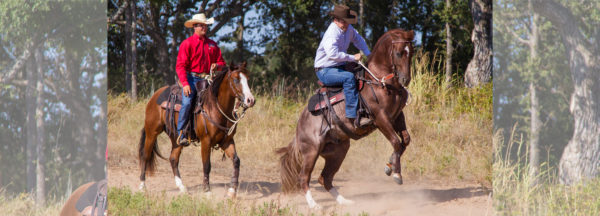Help for Horses That Bite and Kick Others on a Trail Ride

Horses that misbehave in group situations are a hazard to themselves and others. More than likely, you’ve been on a trail ride with a pinny-eared horse that snakes his head around to bite others or tries to lash out with his hind legs. One pinny-eared horse can disrupt an otherwise enjoyable ride and create a very dangerous situation.
While no one wants to be on a pinny-eared horse, keep in mind that it’s common for horses to get a little defensive when another horse comes near them. This is especially true if the horse is a dominant horse in the herd. As the other horses are coming up on him, your horse is just saying, “Hey, you better stay back, or else!” So if your horse pins his ears or gets cranky as another horse comes up close to him, he’s not a particularly bad horse; he’s just being a horse. Now, that doesn’t mean that you should accept the behavior, but before you start to fix a problem, it’s always good to know how and why it developed.
So why would a horse pin his ears or kick at others? “It may be due to a lack of respect. Maybe you never taught your horse to respect you, or you’re not giving him enough to think about when you’re riding. As a result, he has time to cause trouble and worry about keeping other horses out of his personal space,” Clinton says. “When it comes to training horses and working with them on a daily basis, I figure the horse has 23 hours a day to do whatever he wants – eat, sleep, play, whatever. I only ask for an hour or two out of his day, and the least he can do is put on a good attitude and respect me while I’m with him. I make no excuses for cranky attitudes in my horses, whether the horse in question is a mare in heat or an extremely dominant horse in the herd. When I’m riding my horses, their attention and focus had better be on me.”
When it comes to cranky horses, there are two popular schools of thought on how to deal with the problem. “The first approach is to avoid riding in group situations and only ride your horse when you’re sure you’ll be all alone. The second approach is to make excuses for your horse and try to take the responsibility off your shoulders and put it on someone else’s,” Clinton says.
If your horse is kicking or pinning his ears when he’s around others, he’s telling you that you’re not keeping him busy enough and he doesn’t respect your leadership. “In other words, there are holes in your foundation. A lot of groundwork – moving the horse’s feet forwards, backwards, left and right and always rewarding the slightest try – will teach him to respect you and keep his attention focused on you. Although this probably won’t cure the problem, it will certainly help by laying a foundation of respect,” Clinton says.
The best way to get a horse over pinning his ears or kicking other horses is to expose him to other horses, let him commit to the mistake, and then correct him. “Protecting him by keeping him away from other horses is not going to make his cranky attitude go away. In fact, it will only make it worse. A lot of people who have horses that misbehave in group situations mistakenly think that keeping their horse in the barn while others are riding and only sneaking in rides when the trail is clear will fix the problem. That’s like putting a Band-Aid on a sore – it fixes nothing,” Clinton says.
If you’re dealing with a horse that tries to bite or kick other horses during a group ride, Clinton shares strategies to shape up a cranky horse’s attitude in the video “Biting and Kicking Other Horses.” The video is a free resource in the Problem Solving section of the Downunder Horsemanship app.
To access the video, download the Downunder Horsemanship app. When the app opens, scroll down to the Problem Solving section. Select the video, “Biting and Kicking Other Horses.”
The Downunder Horsemanship app is a free download from the App Store and Google Play as well as AppleTV, Roku, Amazon Fire and Android TV. Learn more about the Downunder Horsemanship app and adding it to your device on our website.
